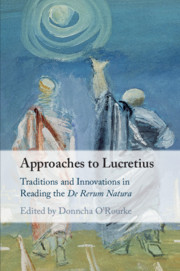Book contents
- Approaches to Lucretius
- Approaches to Lucretius
- Copyright page
- Contents
- Figures
- Notes on Contributors
- Preface
- Abbreviations
- Introduction
- Part I The Text
- Part II Lucretius and his Readers
- Part III The Word and the World
- Part IV Literary and Philosophical Sources
- Part V Worldviews
- Chapter 11 Was Memmius a Good King?
- Chapter 12 A Tribute to a Hero: Marx’s Interpretation of Epicurus in his Dissertation
- Chapter 13 Plato and Lucretius on the Theoretical Subject
- Works Cited
- Index Locorum
- Index Rerum
Chapter 12 - A Tribute to a Hero: Marx’s Interpretation of Epicurus in his Dissertation
from Part V - Worldviews
Published online by Cambridge University Press: 25 June 2020
- Approaches to Lucretius
- Approaches to Lucretius
- Copyright page
- Contents
- Figures
- Notes on Contributors
- Preface
- Abbreviations
- Introduction
- Part I The Text
- Part II Lucretius and his Readers
- Part III The Word and the World
- Part IV Literary and Philosophical Sources
- Part V Worldviews
- Chapter 11 Was Memmius a Good King?
- Chapter 12 A Tribute to a Hero: Marx’s Interpretation of Epicurus in his Dissertation
- Chapter 13 Plato and Lucretius on the Theoretical Subject
- Works Cited
- Index Locorum
- Index Rerum
Summary
This chapter turns to Karl Marx’s treatment of Epicureanism and Lucretius in his doctoral dissertation, and argues that the questions raised by Marx may be brought to bear on our own understanding of Epicurean philosophy, particularly in respect of a tension between determinism and individual self-consciousness in a universe governed by material causation. Following the contours of Marx’s dissertation, the chapter focusses on three key topics: the difference between Democritus’ and Epicurus’ methods of philosophy; the swerve of the atom; and the so-called ‘meteors’, or heavenly bodies. Marx sought to develop Hegel’s understanding of Epicurus, in particular by elevating the principle of autonomous action to a first form of self-consciousness – a consideration largely mediated by Lucretius’ theorization of the atomic swerve and his poem’s overarching framework of liberating humans from the oppression of the gods.
Keywords
- Type
- Chapter
- Information
- Approaches to LucretiusTraditions and Innovations in Reading the <I>De Rerum Natura</I>, pp. 241 - 258Publisher: Cambridge University PressPrint publication year: 2020
- 2
- Cited by

